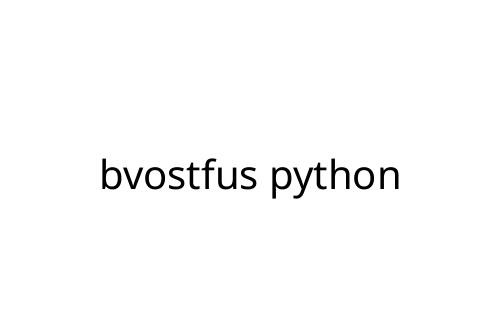## bvostfus python
If you’re searching for insights into bvostfus python, there’s a good chance you’re either curious about a niche Python library, a piece of code from an online discussion, or a specialized software tool. The name doesn’t match any well-known package on PyPI or major Python repositories, so if you’re after direct information about a library called “bvostfus python,” let’s explore what you might need to know for similar situations—how to approach obscure or unfamiliar Python packages and how to research or inspect mysterious code.
### What Is “bvostfus python”?
Currently, there’s no prominent Python library or framework called “bvostfus python.” It could be a typo, an internal tool with limited public exposure, or perhaps a custom module in a private codebase. Sometimes, such names appear in forum posts, code snippets, or documentation as placeholders or pseudonyms.
### How to Handle Unknown Python Packages
Running into unusual names when working with Python is not uncommon. Here’s a step-by-step process to safely investigate them:
#### 1. Research Thoroughly
Start by searching the package name on Google, GitHub, and PyPI. Read any documentation or related forum posts. If you find references in a private codebase, check internal docs or reach out to colleagues.
#### 2. Inspect Before Installing
Never install unfamiliar libraries from unreliable sources. If bvostfus python appears in requirements.txt or setup.py, check the source. Torrent or third-party sites are a red flag. Scan for public reviews, source code, or security advisories.
#### 3. Analyze the Module
If you do locate the package, inspect its contents before use. Open the files in a text editor. Look for clear documentation and well-structured code. Avoid packages with obfuscated code or those lacking a trustworthy development history.
### Pros and Cons of Niche or Obscure Python Libraries
#### Pros
- Can solve highly specific problems not addressed by common libraries.
- May be lightweight or custom-tailored for unique use cases.
#### Cons
- Typically receive limited support and updates.
- Potentially sparse user documentation or community resources.
- Higher security risk from unreviewed code.
### Best Practices for Working with Uncommon Python Code
- **Sandbox Testing:** Always test new libraries in a virtual environment.
- **Check Compatibility:** Make sure the code supports your Python version.
- **Review Dependencies:** Be wary of nested dependencies; they can create vulnerabilities.
- **Assess Community Support:** Less popular libraries may lack maintenance.
### When to Use or Avoid “bvostfus python”-like Tools
If you find “bvostfus python” in a codebase:
- Proceed carefully. Run a search to understand what it does.
- If it’s proprietary or internal, consult your development team.
- For unknown or untrusted packages, consider sticking to established alternatives unless there’s a clear advantage.
### Conclusion
While “bvostfus python” may not refer to a well-known package, evaluating obscure Python modules is a valuable skill. Stay cautious, verify provenance, and prioritize well-maintained tools in your projects. The right approach to mysterious code or libraries keeps your Python environment secure and your projects on track.

 Kenneths Houstonamic established Mode Key Homes to provide real estate enthusiasts, professionals, and homeowners with valuable insights. His vision drives the platform’s focus on market trends, sustainable housing, and property management, helping readers make informed decisions in the ever-evolving real estate landscape.
Kenneths Houstonamic established Mode Key Homes to provide real estate enthusiasts, professionals, and homeowners with valuable insights. His vision drives the platform’s focus on market trends, sustainable housing, and property management, helping readers make informed decisions in the ever-evolving real estate landscape.